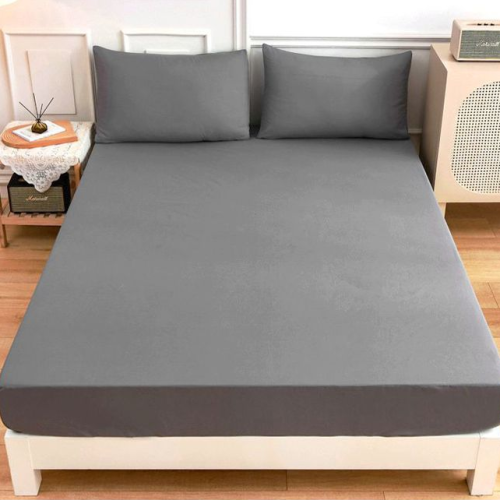
Mattress Covers
When it comes to getting a good night’s sleep, comfort is key. But for people with sensitive skin, comfort isn’t just about a cozy pillow or soft blankets. It’s about ensuring that your skin isn’t irritated by allergens, dust mites, or chemicals in your bedding. If you have sensitive skin, finding the right mattress protector can make all the difference. This is where hypoallergenic mattress covers come in, offering relief from skin irritations while promoting better sleep. In this article, we’ll dive deep into why hypoallergenic mattress covers are beneficial and how they can help with sensitive skin.
What is a Hypoallergenic Mattress Cover?
Definition
A hypoallergenic mattress cover is a protective layer designed to shield your mattress from allergens like dust mites, pet dander, and pollen. Made from materials that are less likely to cause allergic reactions, these covers are ideal for individuals with sensitive skin or respiratory conditions like asthma.
Key Features
These covers are typically made from natural, breathable fabrics, such as organic cotton or bamboo, which prevent the buildup of irritants. They also offer additional benefits like waterproofing and easy maintenance, making them a practical choice for many.
Why Sensitive Skin Needs Special Bedding
Common Skin Conditions Triggered by Bedding
Sensitive skin can react negatively to various substances, including detergents, fabrics, and dust mites. Conditions like eczema, psoriasis, and dermatitis can be worsened by poor-quality bedding. Regular bedding might contain chemicals, dyes, and synthetic fibers that irritate the skin, especially during prolonged contact.
The Role of Allergen-Free Materials
Hypoallergenic mattress covers are designed to prevent allergens from making direct contact with your skin. Materials used are usually free of harsh chemicals, reducing the risk of allergic reactions, rashes, and flare-ups. Choosing hypoallergenic bedding means fewer irritants for your skin to react to, which helps maintain smoother, healthier skin.
How Hypoallergenic Mattress Covers Help with Sensitive Skin
Protection from Allergens
One of the primary benefits of a hypoallergenic mattress cover is its ability to block allergens like dust mites, which can trigger skin and respiratory problems. By using a mattress cover, you’re creating a barrier between your skin and the allergens that could cause flare-ups.
Preventing Skin Irritations
Hypoallergenic covers are also designed to be gentle on the skin. Unlike regular bedding materials, which might scratch or irritate, hypoallergenic fabrics are soft and non-abrasive. This is especially important for people with conditions like eczema or psoriasis, as harsh fabrics can exacerbate symptoms.
Breathability for Comfort
Another advantage is the breathability of hypoallergenic mattress covers. Fabrics like organic cotton and bamboo allow air to circulate, helping to regulate your body temperature and preventing excess moisture buildup. This reduces the chance of skin irritation caused by sweating or trapped heat.
Materials Used in Hypoallergenic Mattress Covers
Organic Cotton
Organic cotton is a popular choice due to its softness, breathability, and chemical-free nature. It’s gentle on the skin and less likely to cause allergic reactions.
Bamboo Fabric
Bamboo fabric is naturally hypoallergenic, antibacterial, and breathable. It’s also moisture-wicking, which keeps you dry and comfortable throughout the night.
Polyester and Vinyl
Some hypoallergenic mattress covers are made from synthetic materials like polyester or vinyl. These fabrics are durable, waterproof, and offer a barrier against dust mites and other allergens. However, they might not be as breathable as natural materials.
Waterproof Options
For those who need extra protection against moisture, waterproof mattress covers made from hypoallergenic materials are available. These covers shield your mattress from spills, sweat, and other moisture-related issues while still protecting against allergens.
Benefits of Hypoallergenic Mattress Covers for Skin Relief
Reducing Allergic Reactions
By preventing allergens from coming into contact with your skin, hypoallergenic mattress covers significantly reduce the likelihood of allergic reactions like itching, redness, and swelling.
Improving Sleep Quality
When your skin isn’t irritated by allergens or chemicals, you’re more likely to get a restful night’s sleep. Hypoallergenic mattress covers promote comfort, which ultimately contributes to better overall health.
Promoting Skin Health
Using a hypoallergenic mattress cover regularly can help keep your skin healthy by minimizing exposure to irritants and promoting a cleaner sleeping environment.
How to Choose the Best Hypoallergenic Mattress Cover
Factors to Consider
When choosing a mattress cover, consider factors like material, breathability, waterproofing, and ease of maintenance. Organic cotton and bamboo are great options for sensitive skin, while waterproof options are beneficial for added protection.
Popular Brands and Reviews
Many reputable brands are offering high-quality hypoallergenic mattress covers. Do some research and check customer reviews to find the best one for your needs.
How to Maintain Your Hypoallergenic Mattress Cover
Cleaning Tips
To maintain the effectiveness of your mattress cover, wash it regularly according to the manufacturer’s instructions. Avoid using harsh detergents that might contain fragrances or chemicals that could irritate your skin.
Avoiding Chemical Residues
After washing, ensure that your mattress cover is thoroughly rinsed to avoid leaving behind any detergent residues that could trigger allergic reactions or skin issues.
Is a Hypoallergenic Mattress Cover Right for You?
Identifying Skin Sensitivity Triggers
If you suffer from skin conditions like eczema or are prone to allergic reactions, a hypoallergenic mattress cover could be a great investment. Pay attention to your symptoms and identify whether allergens in your bedding are contributing to your discomfort.
When to Consider a Mattress Cover
If you’re noticing skin irritation, breathing problems, or restless nights, it’s a good idea to try a hypoallergenic mattress cover. It could help address the underlying issues that regular bedding isn’t managing.
Conclusion
In conclusion, hypoallergenic mattress covers are an essential solution for people with sensitive skin. They not only provide a barrier against allergens but also help to reduce skin irritation and improve overall sleep quality. When choosing a mattress cover, look for one made from breathable, non-toxic materials, and ensure it’s easy to maintain. By making this simple change, you can enjoy better sleep and healthier skin.
If you’re ready to make the switch and experience the benefits for yourself, visit our website for more information on finding the perfect hypoallergenic mattress cover for your needs.
FAQs
What is the difference between a hypoallergenic and a regular mattress cover?
A hypoallergenic mattress cover is designed to block allergens like dust mites, pet dander, and pollen. It’s made from materials that reduce the risk of allergic reactions, unlike regular mattress covers, which may contain chemicals or synthetic fibers that can irritate sensitive skin.
Can hypoallergenic mattress covers help with asthma?
Yes, hypoallergenic mattress covers can help reduce asthma symptoms by blocking dust mites and other allergens that can trigger respiratory issues. They create a cleaner, healthier sleeping environment.
How often should I wash my hypoallergenic mattress cover?
It’s recommended to wash your mattress cover every 1-2 months, or more frequently if you have allergies or sensitive skin. Always follow the manufacturer’s cleaning instructions.
Are hypoallergenic mattress covers waterproof?
Some hypoallergenic mattress covers are designed with waterproof materials, offering protection against moisture while still providing allergen defense. Check the product details before purchasing.
Can a hypoallergenic mattress cover prevent bedbugs?
While a hypoallergenic mattress cover may offer some protection against bedbugs by providing a tight-fitting barrier, it is not a guaranteed solution. For comprehensive bedbug prevention, consider using an encasement designed specifically for bedbugs.

